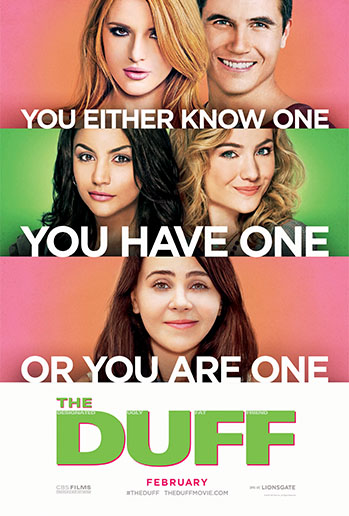Dumbing down the DUFF

The movie adaption of The DUFF loses much of what makes the novel unique in terms of plot and character development. The film favors more of a traditional high school-movie format (Photo Credit: CBS Film).
High school is a place fraught with insecurities. Girls want to be prettier, smarter, and more popular. Often, girls look at their best friends and think, “I want to be more like them.” What most girls don’t realize, however, is that their friends feel exactly the same way. Most feel like the DUFF as Kody Keplinger coins in her debut novel The DUFF: Designated Ugly Fat Friend. According to Keplinger, that is just how friendship works. Throughout the novel, narrator Bianca realizes, “Anyone who [doesn’t] feel like the Duff must not have friends. Every girl feels unattractive sometimes.”
Sadly, the recent film adaptation lacks most of what made The DUFF dazzle.
Keplinger’s debut novel The DUFF tells the story of Bianca Piper, a cynical and loyal teenage girl who has never been the prettiest or most charming of her friends. As resident playboy Wesley Rush informs her at a local hot spot one night, she is their DUFF or designated ugly fat friend. The DUFF, he explains, is the friend easy to approach because no one is trying to hit on her, the friend other people flirt with to get information on the hot friends. As expected, Bianca doesn’t react well, and she spills her Coke on him. Of course, that is not the last time Wesley Rush gets under Bianca’s skin as things quickly heat up between the two. As they embark on a tempestuous relationship, Bianca and Wesley soon learn that there is more to both of them than meets the eye. In addition, Bianca has to deal with a clueless crush, the divorce of her parents, her father’s re-emerging alcoholism, and her own insecurities. Though it is not a wholly original concept, The DUFF delves into the labels teenagers use in high school and how they view themselves with blunt honesty and sharp humor. Bianca is not a perfect girl and makes many dumb decisions. Still, the novel has one of the most genuine characters in young adult fiction, and it is easy to identify with her. For all its flaws, The DUFF is a novel with grit and a lot of heart.
The main problem with the film is the complete reworking of the plot. Consequently, it falls into nearly every high school film cliché. Instead of the enemies with benefits relationship that develops between Bianca and Wesley in the novel, Bianca asks Wesley for help getting her crush to notice her. More screen time is focused on Bianca’s desire not to be the DUFF than any of the real issues she faces in the novel, a fact that will especially aggravate to fans of the novel. There is no alcoholic father Bianca has to learn how to deal with, no distrust of relationships due to her past with Jake, and no real heart. Toby has become a jerk. Casey and Jess are marginalized as characters to a disheartening degree. It almost feels as if director Ari Sandel did not understand the point of the novel or even read it. Instead, he decided to take the title and make a vaguely inspirational teenage comedy. In this DUFF, there was no understanding crushes, no supportive best friends, or Bianca having problems that do not pertain to with being her friends’ DUFF. Instead, there is an unnecessary mean girl, vicious online bullying, and a She’s All That ending. Fans of the novel will leave the theater feeling as if they’ve been cheated, but everyone else will laugh at the jokes and miss the point.
Still, The DUFF is not a terrible film. Mae Whitman, known most recently for her role in the film adaptation of Stephen Chobsky’s Perks of Being a Wallflower, is in her element as Bianca, and there is not a false beat in her performance. Chemistry flies between Whitman and Robbie Amell (Wesley), resulting in a romance that is just as fun and sexy as the one fans love from the novel. There is plenty of comedic talent in this film, and it is hard not to laugh even when you want to cringe. Overall, The DUFF is a relatively good teenage film, but that is all it ends up being. It may disappoint fans who loved the novel that is so much more.
